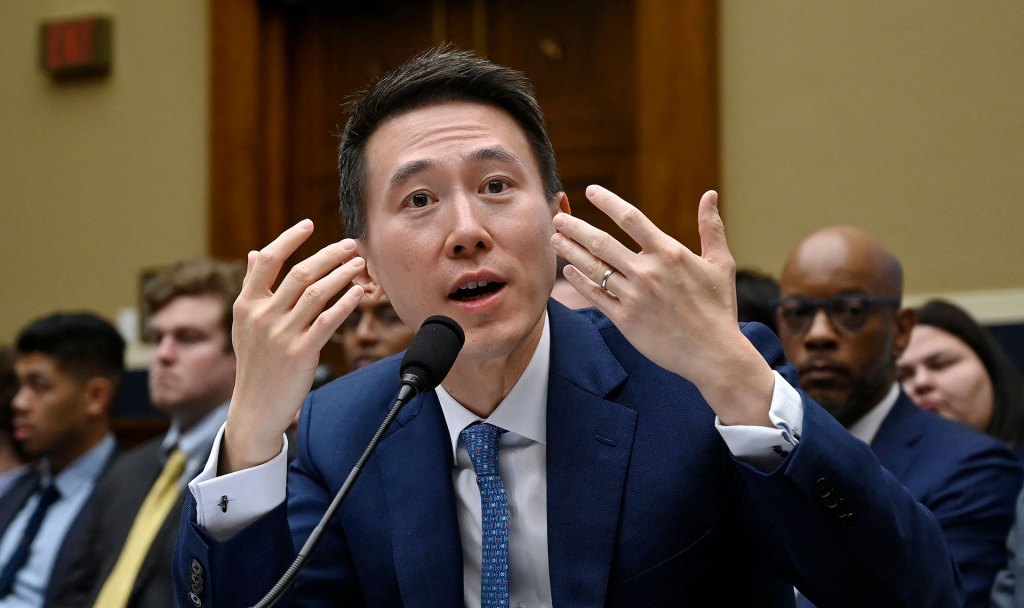Amid questioning about TikTok’s use of biometrics in today’s Congressional hearing, TikTok CEO Shou Zi Chew offered some insight into how the company vets potentially underage users on its platform. After denying the app collects body, face or voice data to identify its users — beyond what’s needed for its in-app AR filters to function, that is — the exec was asked how TikTok determines the age of its users.
Chew’s initial answer was expected: The app uses age gating. This refers to the commonly used method that simply asks a user to provide their birthdate in order to determine their age. In TikTok, there are three different experiences: for under-13 users, younger teens and adults 18+ — which experience the user receives is based on this age input.
Relying on this method alone is a problem, of course, because kids often lie about their age when signing up for social media apps and websites.
As it turns out, TikTok is doing more than looking at the age that’s entered into a text box.
In the hearing, Chew added that TikTok scans users’ videos to determine their age.
“We have also developed some tools where we look at their public profile, to go through the videos that they post to see whether…,” Chew began, before being interrupted by Rep. Buddy Carter (R-GA), who interjected, “That’s creepy. Tell me more about that.”
When Chew was able to continue, he explained “It’s public. So if you post a video, you choose that video to go public — that’s how you get people to see your video. We look at those to see if it matches up the age that you talked about it,” he said.
“Now, this is a real challenge for our industry because privacy versus age assurance is a really big problem,” Chew said.
An interesting follow-up question to the CEO’s response would have been to ask how TikTok was scanning these videos, what specific facial recognition or other technologies it uses, and whether those technologies were built in-house or if it was relying on facial recognition tech built by third parties. Then, of course, whether any of the data that associates the age with the user was being stored permanently rather than being used to simply boot the user off a TikTok LIVE stream, for example.
Unfortunately for us, Carter didn’t pursue this line of questioning.
Instead, he blasted the CEO for dismissing age verification as an industrywide issue.
“We’re talking about children dying!” he exclaimed, referencing the dangerous challenges apps like TikTok and others have allowed to viral, like the blackout challenge. (That challenge resulted in TikTok removing some half a million accounts in Italy to block underage users from its platform at the request of the local regulator.)
TikTok updates Safety Center resources following research on harmful challenges
The reality is that age verification is an industrywide concern and the lack of U.S. laws around children’s use of social media leaves companies like TikTok and others to develop their own processes.
For example, Instagram began verifying users’ ages just last year by offering users a choice of three options. Users could either upload an ID, record a video selfie or ask mutual friends to verify their age on their behalf. The latter is relatively easy to bypass if you have good friends willing to lie for you.
Earlier this month, Instagram rolled out its age verification tools in Canada and Mexico, in addition to the existing support in the U.S., Brazil and Japan. The company had earlier said it had partnered with London-based digital identity startup Yoti for the video selfie part of the age verification process.
Instagram has also previously explained at a high level how it identifies which users it suspects to be underage.
Beyond investigating flagged accounts, the company claims it developed AI technology that it uses to infer someone’s age. Its model has an understanding of how people in the same age group tend to interact with content. Another one of the ways it may identify an underage user who’s lying about their age is by scanning the comments on “Happy Birthday” posts where a user’s age may be referenced. Plus, Instagram said it may try to match a user’s age on Facebook with their stated age on Instagram, along with the use of “many other signals” that it doesn’t disclose.
Instagram starts testing its age verification tools in more countries
TikTok’s technique has been less clear. The company does document how to verify your age if it identified you incorrectly — for example, if you were kicked off LIVE for looking too young. (Last fall TikTok announced it was raising the age requirement for using its in-app livestreaming service, TikTok LIVE to 18, up from 16).
Last year, Bloomberg reported that TikTok met with two providers of facial age-estimation software in 2021. Both companies offered software that could tell the difference between children and adults, but a TikTok exec nixed the deals over fears that facial scanning like this would lead to fears that China was spying on child users, the report had said.
Today, the U.S. had the TikTok CEO in the hot seat, poised to explain the actual techniques TikTok uses for age determination, and all we got were screaming, blustering politicians putting on a show instead of getting real answers.
































Comment